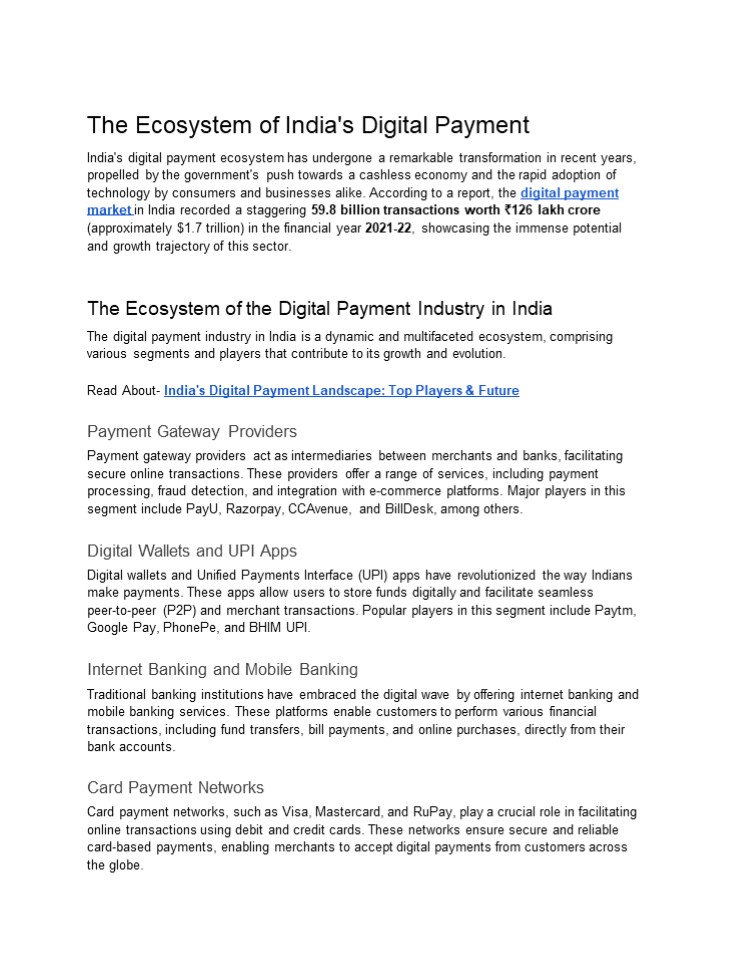The Ecosystem of India's Digital Payment - PowerPoint PPT Presentation
Title:
The Ecosystem of India's Digital Payment
Description:
India's digital payment ecosystem has undergone a remarkable transformation in recent years, propelled by the government's push towards a cashless economy and the rapid adoption of technology by consumers and businesses alike. According to a report, the digital payment market in India recorded a staggering 59.8 billion transactions worth ₹126 lakh crore (approximately $1.7 trillion) in the financial year 2021-22, showcasing the immense potential and growth trajectory of this sector.The Ecosystem of India's Digital Payment – PowerPoint PPT presentation
Number of Views:7
Title: The Ecosystem of India's Digital Payment
1
The Ecosystem of India's Digital Payment India's
digital payment ecosystem has undergone a
remarkable transformation in recent years,
propelled by the government's push towards a
cashless economy and the rapid adoption of
technology by consumers and businesses alike.
According to a report, the digital payment
market in India recorded a staggering 59.8
billion transactions worth ?126 lakh crore
(approximately 1.7 trillion) in the financial
year 2021-22, showcasing the immense potential
and growth trajectory of this sector. The
Ecosystem of the Digital Payment Industry in
India The digital payment industry in India is a
dynamic and multifaceted ecosystem, comprising
various segments and players that contribute to
its growth and evolution. Read About- India's
Digital Payment Landscape Top Players
Future Payment Gateway Providers Payment gateway
providers act as intermediaries between merchants
and banks, facilitating secure online
transactions. These providers offer a range of
services, including payment processing, fraud
detection, and integration with e-commerce
platforms. Major players in this segment include
PayU, Razorpay, CCAvenue, and BillDesk, among
others. Digital Wallets and UPI Apps Digital
wallets and Unified Payments Interface (UPI) apps
have revolutionized the way Indians make
payments. These apps allow users to store funds
digitally and facilitate seamless peer-to-peer
(P2P) and merchant transactions. Popular players
in this segment include Paytm, Google Pay,
PhonePe, and BHIM UPI. Internet Banking and
Mobile Banking Traditional banking institutions
have embraced the digital wave by offering
internet banking and mobile banking services.
These platforms enable customers to perform
various financial transactions, including fund
transfers, bill payments, and online purchases,
directly from their bank accounts. Card Payment
Networks Card payment networks, such as Visa,
Mastercard, and RuPay, play a crucial role in
facilitating online transactions using debit and
credit cards. These networks ensure secure and
reliable card-based payments, enabling merchants
to accept digital payments from customers across
the globe.
2
- Fintech Start-ups and Innovators
- India's thriving fintech ecosystem has given rise
to numerous start-ups and innovators that are
disrupting the digital payment space. These
players are introducing innovative solutions,
such as mobile point-of-sale (mPOS) systems,
contactless payments, and blockchain-based
payment platforms, driving the adoption of
cutting-edge technologies. - Regulatory Bodies and Initiatives
- The Reserve Bank of India (RBI) and the National
Payments Corporation of India (NPCI) are the key
regulatory bodies overseeing the digital payment
landscape in India. Initiatives such as the
Unified Payments Interface (UPI), Bharat QR Code,
and the Payments Infrastructure Development Fund
have played a pivotal role in promoting digital
payments and fostering innovation in the
industry. - Read about- The Industry Analysis of Global
Mobile Phone Accessories Market (2023 to 2030) - Future Forecast
- The digital payment market in India is poised for
remarkable growth in the coming years, driven by
several key factors, including the government's
push for digitization, increasing smartphone and
internet penetration, and the growing preference
for cashless transactions among consumers and
businesses. - According to a report, the digital payment market
in India is projected to reach a staggering - 1 trillion by 2026, reflecting a compound annual
growth rate (CAGR) of approximately 25 - during the forecast period of 2021-2026.
- This remarkable growth trajectory can be
attributed to several key drivers - Government Initiatives and Regulatory Support
The Indian government's initiatives, such as
Digital India and the Unified Payments Interface
(UPI), have played a crucial role in promoting
digital payments and creating a conducive
regulatory environment for the industry's
growth. - Increasing Smartphone and Internet Penetration
With the proliferation of affordable smartphones
and improved internet connectivity, more Indians
are adopting digital payment solutions, driving
the adoption of mobile wallets, UPI apps, and
online banking services. - Rise of E-commerce and Online Services The rapid
growth of e-commerce platforms and online
service providers has fueled the demand for
secure and convenient digital payment options,
encouraging businesses to integrate payment
gateways and digital wallets.
3
authentication, and blockchain-based solutions
gaining traction, further enhancing the user
experience and security of digital transactions.
Conclusion India's digital payment landscape has
undergone a remarkable transformation, driven by
the government's push for digitization, the
rapid adoption of technology, and the growing
preference for cashless transactions among
consumers and businesses. With a current market
size of 59.8 billion transactions worth ?126
lakh crore in the financial year 2021-22, the
digital payment industry in India has emerged as
a vibrant and dynamic ecosystem. This ecosystem
comprises various segments and players, including
payment gateway providers, digital wallets and
UPI apps, internet and mobile banking platforms,
card payment networks, fintech start-ups, and
regulatory bodies. Each of these components plays
a crucial role in facilitating secure and
convenient digital transactions, fostering
innovation, and driving the adoption of cashless
payment solutions.































